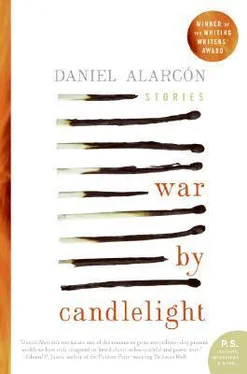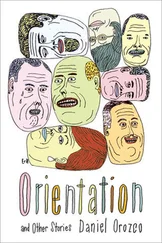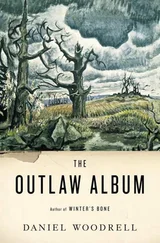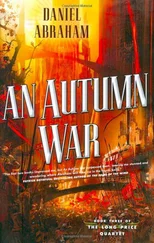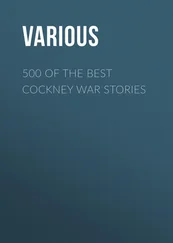Daniel Alarcon - War by Candlelight - Stories
Здесь есть возможность читать онлайн «Daniel Alarcon - War by Candlelight - Stories» весь текст электронной книги совершенно бесплатно (целиком полную версию без сокращений). В некоторых случаях можно слушать аудио, скачать через торрент в формате fb2 и присутствует краткое содержание. Год выпуска: 2006, Издательство: Harper Perennial, Жанр: Современная проза, на английском языке. Описание произведения, (предисловие) а так же отзывы посетителей доступны на портале библиотеки ЛибКат.
- Название:War by Candlelight: Stories
- Автор:
- Издательство:Harper Perennial
- Жанр:
- Год:2006
- ISBN:нет данных
- Рейтинг книги:4 / 5. Голосов: 1
-
Избранное:Добавить в избранное
- Отзывы:
-
Ваша оценка:
- 80
- 1
- 2
- 3
- 4
- 5
War by Candlelight: Stories: краткое содержание, описание и аннотация
Предлагаем к чтению аннотацию, описание, краткое содержание или предисловие (зависит от того, что написал сам автор книги «War by Candlelight: Stories»). Если вы не нашли необходимую информацию о книге — напишите в комментариях, мы постараемся отыскать её.
is an exquisite collection of stories that carry the reader from Third World urban centers to the fault lines that divide nations and people — a devastating portrait of a world in flux — and Daniel Alarcón is an extraordinary new voice in literary fiction, one you will not soon forget.
War by Candlelight: Stories — читать онлайн бесплатно полную книгу (весь текст) целиком
Ниже представлен текст книги, разбитый по страницам. Система сохранения места последней прочитанной страницы, позволяет с удобством читать онлайн бесплатно книгу «War by Candlelight: Stories», без необходимости каждый раз заново искать на чём Вы остановились. Поставьте закладку, и сможете в любой момент перейти на страницу, на которой закончили чтение.
Интервал:
Закладка:
Everything he had been taught came to him with the clarity of intuition: “We must only engage the enemy on our terms.”
Neither side sees the other.
“Scatter.”
In the jungle the trees have fingers and hands, the vines trip you up. You run because death is chasing, because the only way to escape is alone. Fernando fought through the jungle for two days before finding his way to the narrow path along the ridge where they were to regroup. Two days, alone, following trickles of water and minute hints of shadow, calling him first this way, then that. His instincts were urban, made for estimating bus routes and arrival times, not for looking to the skies for clues. He found his way, but not before wondering aloud if this were the place and the moment God had chosen for him to die. He met up with his comrades, they counted heads, quietly mourned the missing without abandoning hope that they might step out of the jungle, shaken but breathing. What had happened? No one knew anything more than he did. They licked their wounds and gathered their resolve. Back into the trees, to wander, to engage the enemy, to fight the people’s war.
But Fernando’s tour ended there. In five weeks, he had never carried a gun. He had never laid an explosive. The war, he thought — his war — had amounted to walking circles through the forest, going hungry, and picking insects off his skin each morning. Trying to stay dry. Praying not to be found.
He boarded a bus in a provincial town and began his journey back to the coast. He wondered if people knew, if he would ever feel completely safe again. Three times the bus was emptied while soldiers searched the baggage hold for weapons. His forged identification papers were inspected by police at isolated mountain checkpoints. Each time Fernando tensed, but they let him through. “Go on,” the soldiers said, and Fernando did his best not to act surprised, or worse, grateful. The ride home took two days. Fernando ate in minuscule mountain towns, on wooden benches that sagged beneath the weight of a half dozen bleary-eyed passengers. He did his best to sleep, his head bumping against the fogged-over window. He returned to Lima overjoyed to be alive. It was a relief so overwhelming it made him dizzy.
That first night back he told Maruja he wouldn’t leave Lima again. She’d thrown her arms around him when he first came in but had almost immediately pulled away. She avoided him, wouldn’t even look at him. “What’s wrong?” he asked.
There were lines on her face he’d never noticed before. She bit her lip. Her eyes were red. “I thought you were dead,” Maruja said.
Their apartment was cramped and small. He sat at the kitchen table while she prepared the candles and the matches. They listened for the rumble of war’s progress, for a bomb to scratch out the quiet, the calm. It happened almost every night now. Electrical towers felled by explosives, a hammer and sickle ignited on the hillsides. It was best to be prepared. A pot of water boiled on the stove. He skimmed six weeks’ worth of newspapers. She’d saved him the front pages, thrown away the rest. She summarized for him: “While you were dead,” Maruja told him, “things got worse.”
She wasn’t going to forgive him easily. From the stack of scattered pages, she pulled one. It was dated from a week and a half before, and told of the ambush he’d fled. There were photos of the camp, of the weapons seized, and one of six lifeless bodies laid in a neat row. Though their faces were covered, Fernando knew them. They were his men, his friends. They had names. He recognized them by the shoes they wore.
An hour later, they heard it: boom .
Lights flickered and faded.
In the tense dark of their apartment, it occurred to him that he wanted a child. It struck him as exactly right. He felt embarrassed to tell Maruja. He said nothing. His entire body ached. They listened in darkness to the radio announcer calmly describing the evening’s events. The room glowed orange.
Sometime in the middle of the night, when she was asleep and the candle had gone out, he reached for her.
It took him weeks to regain his courage. The city appeared strange to him, and his two-day walk through the jungle still had the glow of an apparition. Some mornings he woke and caught himself dreaming of insects and flittering birds. Bombs. Running. He caught himself paying attention to strangers’ shoes. Every day he thought of the child he wanted. He rode through the city, debating quietly with himself: a child was a preposterous thing to want at a time like this. Absurd. Dangerous. Around him, men and women were disappearing, people dying. It was no time to indulge in bourgeois fantasies. But he let himself imagine fatherhood and a hundred other conventional pleasures: a small house with a courtyard, an olive tree, and a tomato plant, a childhood like the one he’d had. Sometimes Fernando imagined himself as an old man, the war long since over and nearly forgotten. His children now grown, his grandchildren asking to be told stories. What stories would he and Maruja tell them? Stories of survival, perhaps: How we fled Lima, Fernando mused. How we escaped the war.
He was riding a bus one day when a young woman got on. Visibly pregnant, her belly pushed dramatically against her dress. She was pretty, her lustrous hair in a single braid, woven as thick as rope. He gave her his seat. She didn’t thank him, or notice him hovering over her. The bus stumbled on, filled past capacity. Fernando kept his right hand in his pocket, holding his wallet, and the other he placed on the back of the pregnant woman’s seat. What was he expecting? He wanted her to pull out a book of baby names, or a spool of yarn to knit tiny socks. She didn’t. She chewed gum. There was nothing at all special about her except that beautiful roundness. Fernando couldn’t help but stare. He tensed. Finally, she opened her bag, pulled out a newspaper, and turned it to the crossword. Then there was a pushing and a jostling on the bus, and someone was being robbed at that exact moment. Everyone knew it: a dozen pairs of eyes darting back and forth, accusing. The pregnant woman sat still, unconcerned, nibbling on the tip of her plastic pen. By the time he got off, she’d fallen asleep with the crossword half-done in her lap.
That night, like every night, he and Maruja sat by candlelight, listening to the radio. But he had heard enough: the news was uniformly dismal, and it did no good to hear it all. He turned it off. He told her: “Let’s have a baby.”
They sat close together and spoke in circles about the child, he saying yes, she saying no.
He’d already heard her arguments, of course. They were his own. He suspected they were true, but as she voiced them, they sounded profoundly pessimistic. Hadn’t they always believed in a future? Had they come to this place so soon: were they this defeated already? He held his head in his hands and cried, Maruja stroking his hair, wrapping the black curls around her fingers. Did she have to hurt him like this? She took his glasses and laid them on the nightstand. Their bed, resting on cinder blocks, creaked as she stretched. With the flame clinging to the wick, orange light gliding along the walls, Fernando told her for the first time of the jungle. “I walked for days. Alone. I could barely see the sky, and I was sure someone was following me.”
Maruja touched him, kissed him. She laid him down and undressed him. Fernando could scarcely keep his eyes open. It wasn’t such a terrible thing to want, was it? The city was full of children.
“We can’t, Nano.” She sighed deeply. “I can’t.”
Maruja had two boys from her first marriage, the oldest now nearing fifteen. Fernando was good with her children. He took them to San Miguel or to the movies. The noise and chaos of parenting seemed to excite him, to energize him, and Fernando would drive the children, singing and shouting. When they played soccer, Fernando would feed the pass that let his stepchildren shine. They were the youngest players on the field, but he made them feel welcome, wanted. He picked them first. Maruja’s children were in love with Fernando. They let him know. All of this, Fernando thought, was proof. Hasn’t she seen me with them? “I’d be a good father,” he said.
Читать дальшеИнтервал:
Закладка:
Похожие книги на «War by Candlelight: Stories»
Представляем Вашему вниманию похожие книги на «War by Candlelight: Stories» списком для выбора. Мы отобрали схожую по названию и смыслу литературу в надежде предоставить читателям больше вариантов отыскать новые, интересные, ещё непрочитанные произведения.
Обсуждение, отзывы о книге «War by Candlelight: Stories» и просто собственные мнения читателей. Оставьте ваши комментарии, напишите, что Вы думаете о произведении, его смысле или главных героях. Укажите что конкретно понравилось, а что нет, и почему Вы так считаете.
